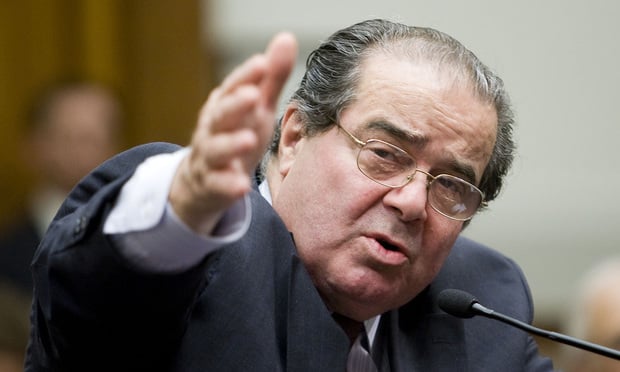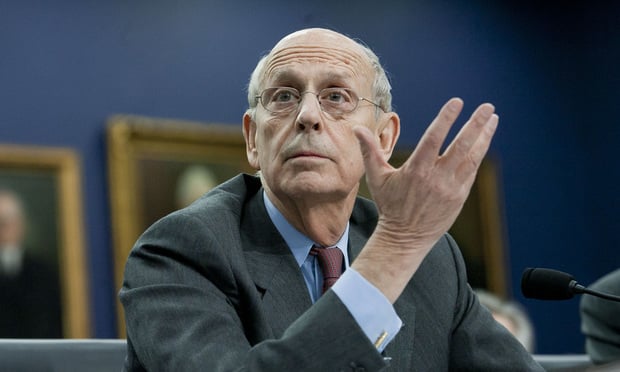'Laughter Is a Blood Sport' at the Supreme Court, Scholars Say in New Study
Humor at the U.S. Supreme Court is less an "indication not of lighthearted, good-natured jesting" than a "rhetorical weapon," legal scholars Tonja Jacobi and Matthew Sag contend.
March 08, 2019 at 12:18 PM
5 minute read
The original version of this story was published on National Law Journal
 Justice Antonin Scalia (2010) Photo by Diego M. Radzinschi/THE NATIONAL LAW JOURNAL
Justice Antonin Scalia (2010) Photo by Diego M. Radzinschi/THE NATIONAL LAW JOURNAL
U.S. Supreme Court justices direct their humorous quips and barbs most often at advocates with whom they disagree, lawyers who are losing their arguments and attorneys who do not have experience at the high court, according to an exhaustive new study.
In their study “Taking Laughter Seriously at the Supreme Court,” two scholars—Tonja Jacobi of Northwestern University School of Law and Matthew Sag of Loyola University of Chicago Law School—built and analyzed a database of every Supreme Court oral argument transcript from 1955 to 2017.
Jacobi and Sag said they found more than 9,000 instances of laughter in 6,864 cases over 63 years. Transcripts of hearings include a reference to “laughter.”
“From our analysis of eight terms, we believe that laughter at Supreme Court oral arguments tends to be an indication not of lighthearted, good-natured jesting by a superior to an inferior, but of a rhetorical weapon being used by a superior against an inferior, by a justice as a form of advocacy against an advocate arguing a side the justice likely will oppose, or when an advocate is inexperienced or doing badly,” the authors said. In other words: “Laughter is a blood sport at the court.”
Jacobi and Sag said they listened to many high court arguments and heard patterns in the justices' comments that provoked laughter. “We were interested in the way humor is used—whether it is part of advocacy by the justices, like their interruptions. And sure enough it really is part of that advocacy process,” Jacobi said.
Sag said “the idea that the judges who get the most laughs are somewhat funny never struck me as that plausible. Courtroom humor is really about people being uncomfortable for being put on the spot, occasionally there is some absurdism.”
If advocates familiarize themselves with the kinds of humor that appeal to the justices, they can think more about how to respond, Sag said. “In statutory interpretation cases, it's almost inevitable Justice Alito will make some joke about Congress,” he said. “When a case lends itself to different hypothetical situations, one form of humor is exaggerations, and when you see that kind of rhetoric coming, you are better prepared to answer it.”
Here are a few conclusions from their analysis:
>> The modern Supreme Court—the Rehnquist and Roberts eras—accounts for two-thirds of laughter moments, despite covering less than half of the time period studied. For example, the Warren and Burger Court justices accounted for only 6 percent and 14 percent of judicial courtroom humor, respectively, whereas the Rehnquist and Roberts courts accounted for 48 percent and 32 percent, respectively, of comments by justices inspiring laughter.
>> Looking closely at the rate of laughter associated with each justice over their time on the bench, the study confirmed that Justice Antonin Scalia played a significant role in the increased incidence of laughter, but his influence was by no means dominant.
 Justice Stephen Breyer testifies in 2015. Photo by Diego M. Radzinschi/THE NATIONAL LAW JOURNAL
Justice Stephen Breyer testifies in 2015. Photo by Diego M. Radzinschi/THE NATIONAL LAW JOURNAL>> Ranking the justices by mean laughter per oral argument 1955-2017: Scalia holds the first slot and Breyer was second. “Justice Scalia is often lauded for being so funny, but if laughter is a weapon, that means that Justice Scalia is simply the most acerbic, and the most strategic at this particular type of advocacy,” according to the study. Jacobi and Sag said about Breyer: “By far the majority of his jokes involve either silliness or self-deprecation.” Chief Justice John Roberts Jr. was third, followed by Justice Neil Gorsuch and then Justices Elena Kagan, David Souter, Felix Frankfurter, William Rehnquist, Anthony Kennedy and John Paul Stevens. Frankfurter is the only justice from the earlier part of the data set who mirrors the behavior of the modern justices.
>> There is a large effect of making jokes during the time of losing advocates. But neutrality toward advocates makes Roberts “remarkable.”
>> The justices are significantly more likely to make the kind of comments that provoke laughter in the courtroom while a “novice,” making their first argument, is speaking, and significantly less likely to do so during the time of the advocates that the study classifies as “heroes,” a lawyer who has argued at least 11 times.
>> So considering all of the data, what does the “funniest justice” title mean? “In general, it means that these justices are the most pointed advocates,” Jacobi and Sag concluded. “Justice Breyer, and to a lesser extent Justice Kagan, are exceptional in being self-deprecating, but we have shown that overall humor of the court is pretty mean.”
Read more:
How to Tell a Justice You Are Wrong
Everything Was 'Excellent' In Key Patent Case at Supreme Court
Hypothetical President, Grammar Lessons & 'Beautiful' Hovercrafts: Laugh Lines
What Makes Chief Justice John Roberts Lose His Cool
Kagan Says Repeat Players at SCOTUS 'Know What It Is We Like'
This content has been archived. It is available through our partners, LexisNexis® and Bloomberg Law.
To view this content, please continue to their sites.
Not a Lexis Subscriber?
Subscribe Now
Not a Bloomberg Law Subscriber?
Subscribe Now
NOT FOR REPRINT
© 2025 ALM Global, LLC, All Rights Reserved. Request academic re-use from www.copyright.com. All other uses, submit a request to [email protected]. For more information visit Asset & Logo Licensing.
You Might Like
View All
State Appellate Court Rejects Reasoning for Attorney's Removal From Conservatorship
5 minute read
'Pay What Is Owed': State Appellate Court Affirms $19M Verdict for Software Contractor
5 minute read
Statute of Limitations Shrivels $5M Jury Award to Less than $1M, 8th Circuit Rules
4 minute read
Standing Spat: Split 2nd Circuit Lets Challenge to Pfizer Diversity Program Proceed
Trending Stories
- 1Reviewing Judge Merchan's Unconditional Discharge
- 2With New Civil Jury Selection Rule, Litigants Should Carefully Weigh Waiver Risks
- 3Young Lawyers Become Old(er) Lawyers
- 4Caught In the In Between: A Legal Roadmap for the Sandwich Generation
- 5Top 10 Developments, Lessons, and Reminders of 2024
Who Got The Work
J. Brugh Lower of Gibbons has entered an appearance for industrial equipment supplier Devco Corporation in a pending trademark infringement lawsuit. The suit, accusing the defendant of selling knock-off Graco products, was filed Dec. 18 in New Jersey District Court by Rivkin Radler on behalf of Graco Inc. and Graco Minnesota. The case, assigned to U.S. District Judge Zahid N. Quraishi, is 3:24-cv-11294, Graco Inc. et al v. Devco Corporation.
Who Got The Work
Rebecca Maller-Stein and Kent A. Yalowitz of Arnold & Porter Kaye Scholer have entered their appearances for Hanaco Venture Capital and its executives, Lior Prosor and David Frankel, in a pending securities lawsuit. The action, filed on Dec. 24 in New York Southern District Court by Zell, Aron & Co. on behalf of Goldeneye Advisors, accuses the defendants of negligently and fraudulently managing the plaintiff's $1 million investment. The case, assigned to U.S. District Judge Vernon S. Broderick, is 1:24-cv-09918, Goldeneye Advisors, LLC v. Hanaco Venture Capital, Ltd. et al.
Who Got The Work
Attorneys from A&O Shearman has stepped in as defense counsel for Toronto-Dominion Bank and other defendants in a pending securities class action. The suit, filed Dec. 11 in New York Southern District Court by Bleichmar Fonti & Auld, accuses the defendants of concealing the bank's 'pervasive' deficiencies in regards to its compliance with the Bank Secrecy Act and the quality of its anti-money laundering controls. The case, assigned to U.S. District Judge Arun Subramanian, is 1:24-cv-09445, Gonzalez v. The Toronto-Dominion Bank et al.
Who Got The Work
Crown Castle International, a Pennsylvania company providing shared communications infrastructure, has turned to Luke D. Wolf of Gordon Rees Scully Mansukhani to fend off a pending breach-of-contract lawsuit. The court action, filed Nov. 25 in Michigan Eastern District Court by Hooper Hathaway PC on behalf of The Town Residences LLC, accuses Crown Castle of failing to transfer approximately $30,000 in utility payments from T-Mobile in breach of a roof-top lease and assignment agreement. The case, assigned to U.S. District Judge Susan K. Declercq, is 2:24-cv-13131, The Town Residences LLC v. T-Mobile US, Inc. et al.
Who Got The Work
Wilfred P. Coronato and Daniel M. Schwartz of McCarter & English have stepped in as defense counsel to Electrolux Home Products Inc. in a pending product liability lawsuit. The court action, filed Nov. 26 in New York Eastern District Court by Poulos Lopiccolo PC and Nagel Rice LLP on behalf of David Stern, alleges that the defendant's refrigerators’ drawers and shelving repeatedly break and fall apart within months after purchase. The case, assigned to U.S. District Judge Joan M. Azrack, is 2:24-cv-08204, Stern v. Electrolux Home Products, Inc.
Featured Firms
Law Offices of Gary Martin Hays & Associates, P.C.
(470) 294-1674
Law Offices of Mark E. Salomone
(857) 444-6468
Smith & Hassler
(713) 739-1250








